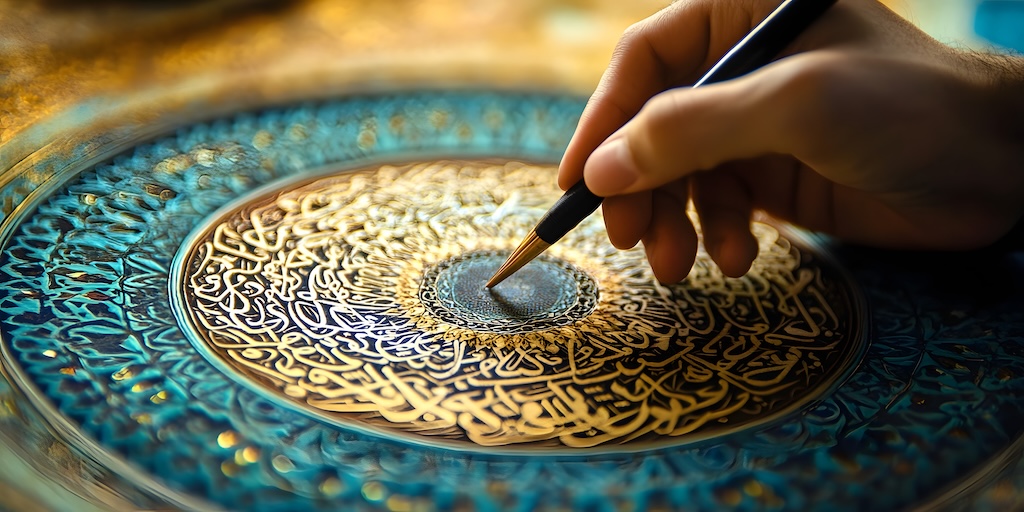The Arabic language is one of the most important roots of Arab and Islamic identity. It is not just a means of communication, but a history, a culture, and a way of life that reflects the nation’s identity through the ages. When a person speaks their mother tongue, they express their connection to their culture, identity, and rich history.
Throughout history, Arabic has played a unifying role for Arabs despite the differences in their countries and dialects. Preserving the Arabic language means preserving identity itself, because when a society loses its language, it loses part of its memory and history.
For this reason, Arab communities strive to teach their children Classical Arabic and encourage them to read and write in it so that it remains alive and dynamic. This is especially visible among Arab communities living abroad, where families work hard to teach their children Arabic and preserve their linguistic heritage.
With global development and the rise of modern technologies, Arabic continues to prove its ability to adapt by Arabizing new terms and producing rich digital Arabic content. Language academies, such as those in Damascus, Cairo, and Tunisia, play a vital role in this mission by standardizing terminology and developing dictionaries.
All these efforts aim to preserve the Arabic tongue and enable us to express ourselves in a multicultural world, ensuring that we remain a living part of the future without losing our roots or identity.
إِنَّ اللُّغَةَ العَرَبِيَّةَ مِنْ أَهَمِّ جُذُورِ الهُوِيَّةِ العَرَبِيَّةِ وَالإِسْلَامِيَّةِ. فَهِيَ لَيْسَتْ مُجَرَّدَ وَسِيلَةٍ لِلتَّوَاصُلِ، بَلْ هِيَ تَارِيخٌ وَثَقَافَةٌ وَأُسْلُوبُ حَيَاةٍ يَعْكِسُ هُوِيَّةَ الأُمَّةِ عَلَى مَرِّ العُصُورِ. وَعِنْدَمَا يَتَحَدَّثُ الإِنْسَانُ بِلُغَتِهِ الأُمِّ، فَإِنَّ ذَلِكَ يُظْهِرُ ارْتِبَاطَهُ بِثَقَافَتِهِ وَهُوِيَّتِهِ وَتَارِيخِهِ العَرِيقِ.
لَقَدْ قَامَتِ اللُّغَةُ العَرَبِيَّةُ دَوْرًا مُهِمًّا فِي تَوْحِيدِ العَرَبِ عَلَى الرَّغْمِ مِنِ اخْتِلَافِ بُلْدَانِهِمْ وَلَهَجَاتِهِمْ، وَجَسَّدَتِ القِيَمَ الَّتِي يَتَشَارَكُونَهَا. وَمِنْ هُنَا، يَكُونُ الحِفَاظُ عَلَى اللُّغَةِ مَعْنَاهُ الحِفَاظُ عَلَى الهُوِيَّةِ ذَاتِهَا، فَإِذَا فَقَدَتِ اللُّغَةُ مَكَانَتَهَا فِي المُجْتَمَعِ فَقَدَ النَّاسُ جُزْءًا مِنْ ذَاكِرَتِهِمْ وَتَارِيخِهِمْ.
لِذَلِكَ، تَسْعَى المُجْتَمَعَاتُ العَرَبِيَّةُ إِلَى تَعْلِيمِ أَبْنَائِهَا اللُّغَةَ الفُصْحَى وَتَشْجِيعِهِمْ عَلَى القِرَاءَةِ وَالكِتَابَةِ بِهَا، لِتَبْقَى حَيَّةً وَمُتَجَدِّدَةً. وَيَظْهَرُ ذَلِكَ جَلِيًّا فِي الجَالِيَاتِ العَرَبِيَّةِ فِي الغَرْبِ، حَيْثُ تَبْذُلُ الأُسَرُ جُهُودًا كَبِيرَةً لِتَعْلِيمِ أَوْلَادِهَا اللُّغَةَ وَالحِفَاظِ عَلَيْهَا.
وَمَعَ تَطَوُّرِ العَالَمِ وَظُهُورِ التِّقْنِيَاتِ الحَدِيثَةِ، تُثْبِتُ اللُّغَةُ العَرَبِيَّةُ قُدْرَتَهَا عَلَى مُوَاكَبَةِ العَصْرِ مِنْ خِلَالِ تَعْرِيبِ المُصْطَلَحَاتِ وَإِنْشَاءِ مُحْتَوًى رَقْمِيٍّ عَرَبِيٍّ. وَتَلْعَبُ مَجَامِعُ اللُّغَةِ دَوْرًا رَائِدًا فِي هَذَا المَجَالِ، مِثْلَ مَجْمَعِ اللُّغَةِ العَرَبِيَّةِ بِدِمَشْقَ وَمَجْمَعِ القَاهِرَةِ وَبَيْتِ الحِكْمَةِ فِي تُونُسَ، حَيْثُ تُطْلِقُ مَشَارِيعَ لِتَوْحِيدِ المَصْطَلَحَاتِ وَتَطْوِيرِ المُعْجَمَاتِ.
هَذِهِ الجُهُودُ تَهْدِفُ إِلَى الحِفَاظِ عَلَى لِسَانِنَا العَرَبِيِّ وَتَمْكِينِنَا مِنَ التَّعْبِيرِ عَنْ أَنْفُسِنَا فِي عَالَمٍ مُتَعَدِّدِ الثَّقَافَاتِ، لِنَكُونَ جُزْءًا فَاعِلًا مِنَ المُسْتَقْبَلِ دُونَ أَنْ نَفْقِدَ جُذُورَنَا وَهُوِيَّتَنَا..
https://forms.gle/ppSFMMFJNfLrFzuZ9 اختبر نفسك
Test yourself https://forms.gle/Fx1eqFaJMPsaqAkw8

